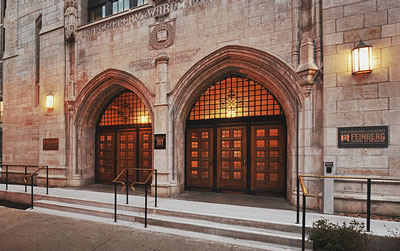Author: kwm107
-

NUCATS Awarded $46 Million to Transform Scientific Discovery into Treatments
Northwestern University has received a five-year, $46 million grant from the National Institutes of Health to renew the Northwestern University Clinical and Translational Sciences (NUCATS) Institute.
-

Map of Broken Brain Networks Shows Why People Lose Speech in Language-Based Dementia
Northwestern Medicine scientists have pinpointed the location of dysfunctional brain networks that lead loss of language in primary progressive aphasia, a form of dementia.
-

Total Heart Disease Deaths on The Rise
Total deaths from heart disease, stroke, diabetes and hypertension have been increasing since 2011, according to a new Northwestern Medicine study.
-

Public Health Boot Camp Graduates Its 2019 Cohort
In partnership with the AIDS Foundation of Chicago and several Northwestern University Feinberg School of Medicine departments and centers, the Public Health Boot Camp delivers an annual week-long residential training program for HIV/AIDS community-based service providers.
-

ALS Drug Grant to Spur Drug Discovery at Northwestern
Two Northwestern University scientists have received a $3.1 million grant from the National Institute on Aging to collaborate and investigate drug therapies for amyotrophic lateral sclerosis (ALS).
-

Movement and Rehabilitation Sciences Training Day Highlights Innovative Research
The 9th annual Movement and Rehabilitation Sciences Training Day brought together a group of more than 100 scientists and students across departments and programs to showcase research collaborations.
-

Sesame Allergy is More Common Than Previously Recognized
Sesame allergy affects more than 1 million children and adults in the U.S., more than previously known, according to a new Northwestern Medicine study.
-

Resilient Shark Spines May Inform Treatment for Human Bone Disease
Northwestern Medicine scientist Stuart Stock uses powerful imaging technology to better understand shark vertebrae’s formation and strength, information that may help people with degenerative bone diseases.
-

New Dining Options on Campus
The opening of the new Louis A. Simpson and Kimberly K. Querrey Biomedical Research Center is poised to bring even more additions to dining options on the Chicago campus, with new outlets opening by late fall.
-

Innovative Imaging Approach Uncovers Pathway Changes After Stroke
A new study measured changes in neural pathways after a stroke, finding that many patients’ nervous systems appear to shift activity to undamaged motor pathways from the brain and the brainstem.





